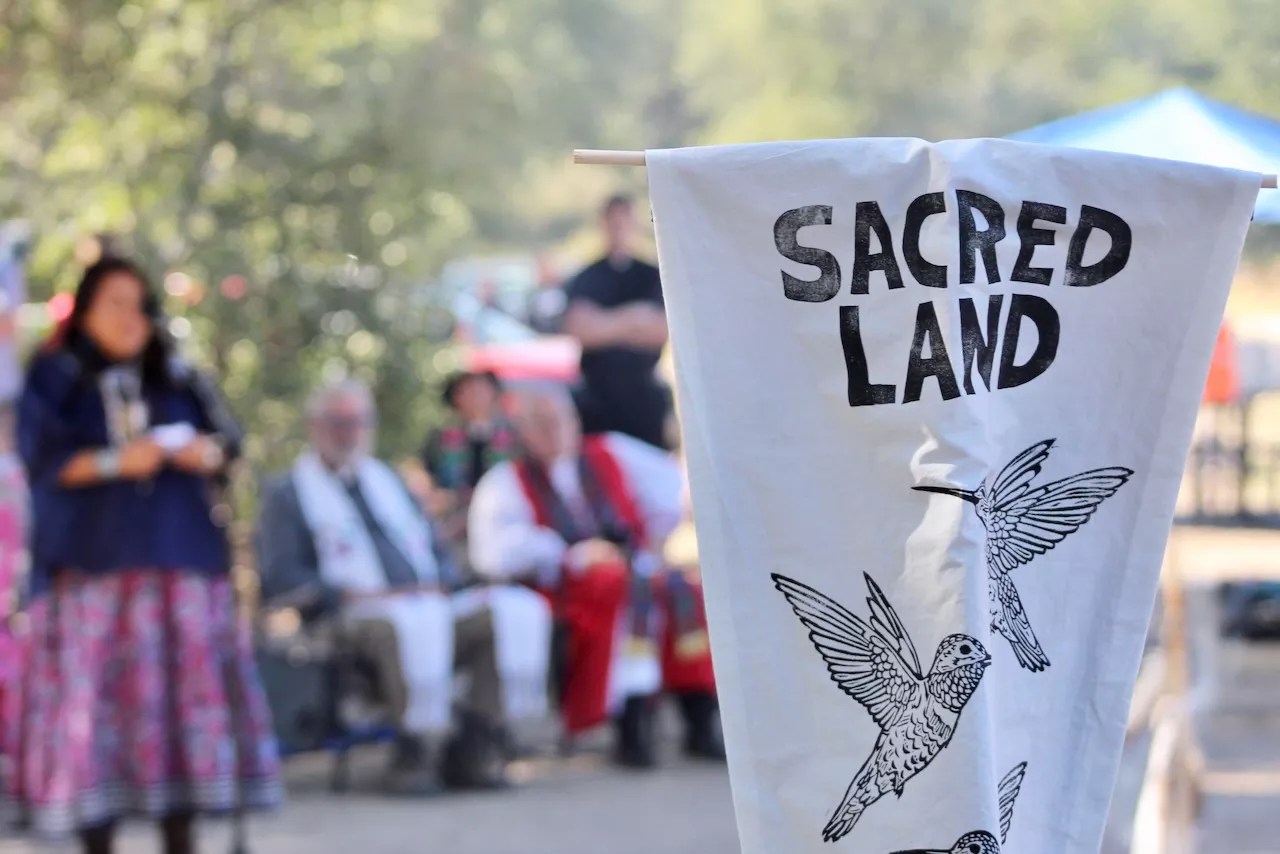
TJ L’Heureux

Audio By Carbonatix
Update: The fate of Oak Flat will soon rest in the hands of the U.S. Supreme Court.
A special panel of the U.S. Court of Appeals for the 9th Circuit ruled 6-5 in March to allow the transfer of Oak Flat to a foreign-owned mining company. Apache Stronghold, the coalition challenging the land transfer, asked for all 29 judges on the court to hear the case, but was denied on May 14.
“Oak Flat is the place where generations of Apaches have come to connect with our Creator, our faith and our land,” Wendsler Nosie Sr. of Apache Stronghold said in a press release. “We pray the Supreme Court will take our case and protect Oak Flat the same way it would protect other historic houses of worship across the country.”
Phoenix New Times last reported on Oak Flat on Nov. 17. Below is that story.
***
Decades ago, the third-largest known copper deposit in the world was found beneath the ground of Chi’chil BiÅ‚dagoteel, an hour east of Phoenix. Located in Tonto National Forest, the land is a holy place for Native Americans. In English, it’s known as Oak Flat.
It’s also at the center of a nearly three-year-long legal battle that’s likely to reach the U.S. Supreme Court.
The federal government wants to swap roughly 2,400 acres of federally protected forest in the area for 5,000 acres of private land around Arizona so Australian-British mining companies can extract the mineral deposits located beneath Oak Flat. Opponents sued in 2021 to block the land swap.
The lawsuit, led by the nonprofit group Apache Stronghold, reached a three-member panel of the 9th U.S. Circuit Court of Appeals, which initially ruled in favor of the government. The full court reheard the case in March, and its decision could come at any time.
On Nov. 4, religious leaders from around the country traveled to Oak Flat to join Apache Stronghold in a day-long prayer session for the land. Though from different faith traditions, the speakers agreed on a critical idea: While religions emerged from a spiritual connection to the Earth, industrial capitalism has severed that bond today.
Wendsler Nosie Sr., leader of Apache Stronghold and a former chair of the San Carlos Apache Tribe, has been an outspoken opponent of the mining incursion for years.
Nosie is descended from Chiricahua and Yavapai Apaches from different parts of the state. He said his people were brought as “prisoners of war” to the San Carlos Apache Indian Reservation, where they were forced to live despite having no connection to the land.
“My grandfather, my dad and my uncles always talked about the day of returning back home,” Nosie told Phoenix New Times, referring to Oak Flat and other ancestral Apache lands. “We’re more or less living in a place of a prison (the San Carlos Apache Reservation).”
Nosie said his great-grandfather and his mountain-based people did not understand why the U.S. government relentlessly fought them and forced them onto the desolate desert reservation about 150 years ago.
“It all ended up in my dad’s time that it was the minerals they were after. And they were doing anything and everything possible to us to remove us,” Nosie said.
Rio Tinto, one of the two companies that owns Resolution Copper, is an Australian multinational conglomerate with a history of damaging Indigenous land. In 2020, the company destroyed two rock shelters in Western Australia that Indigenous people had inhabited for 46,000 years. Following public backlash, the company’s CEO resigned later that year.
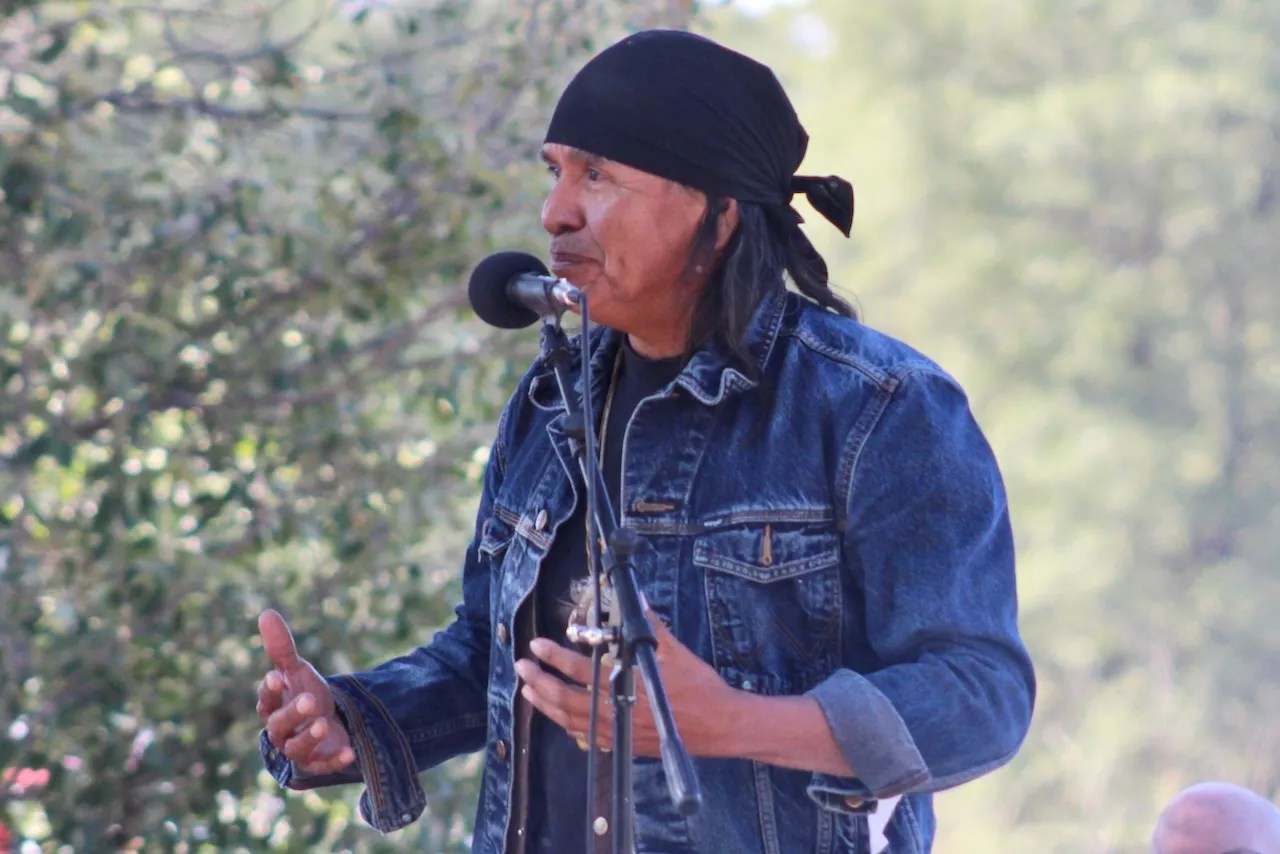
Wendsler Nosie Sr. speaks to people gathered at the Nov. 4 event at Oak Flat. Nosie has led Apache Stronghold’s fight to save Oak Flat and prevent Resolution Copper from taking over the sacred land of his people.
TJ L’Heureux
‘Christianity did not form in a building’
Hummingbirds are featured prominently on banners that Apache Stronghold placed around Oak Flat for the Nov. 4 prayer gathering. The birds are a symbolic image.
“In our religion, the hummingbird is a messenger from the ones that are holy. You see them everywhere” in Oak Flat, Noise said, because, according to him, the area is home to angels.
But even Christian leaders at the prayer gathering spoke about Jesus Christ’s connection to God through the Earth and its living things. Rev. Stephen James Keplinger of Grace St. Paul’s Episcopal Church in Tucson was one of several speakers who decried a society that is increasingly disconnected from the Earth.
“Two-thousand years ago, Christianity was born surrounded by animals. The basis for the faith was discovered in a vision quest of an indigenous man named Jesus in the desert wilderness,” Keplinger said. “Christianity did not form in a building but in a sacred desert that contained God’s essence, just like this (Oak Flat).”
He also said that Christianity lost its connection to the natural world by “casting God into outer space.”
“If we had just listened to our Apache siblings 350 years ago, we could have regained that part of our ancient tradition that we lost. We could have restored our relationship with all of the Earth centuries ago,” Keplinger said. “If we allow this last riparian area to be destroyed, we are literally allowing the destruction of the creator, severing our connection to God.”
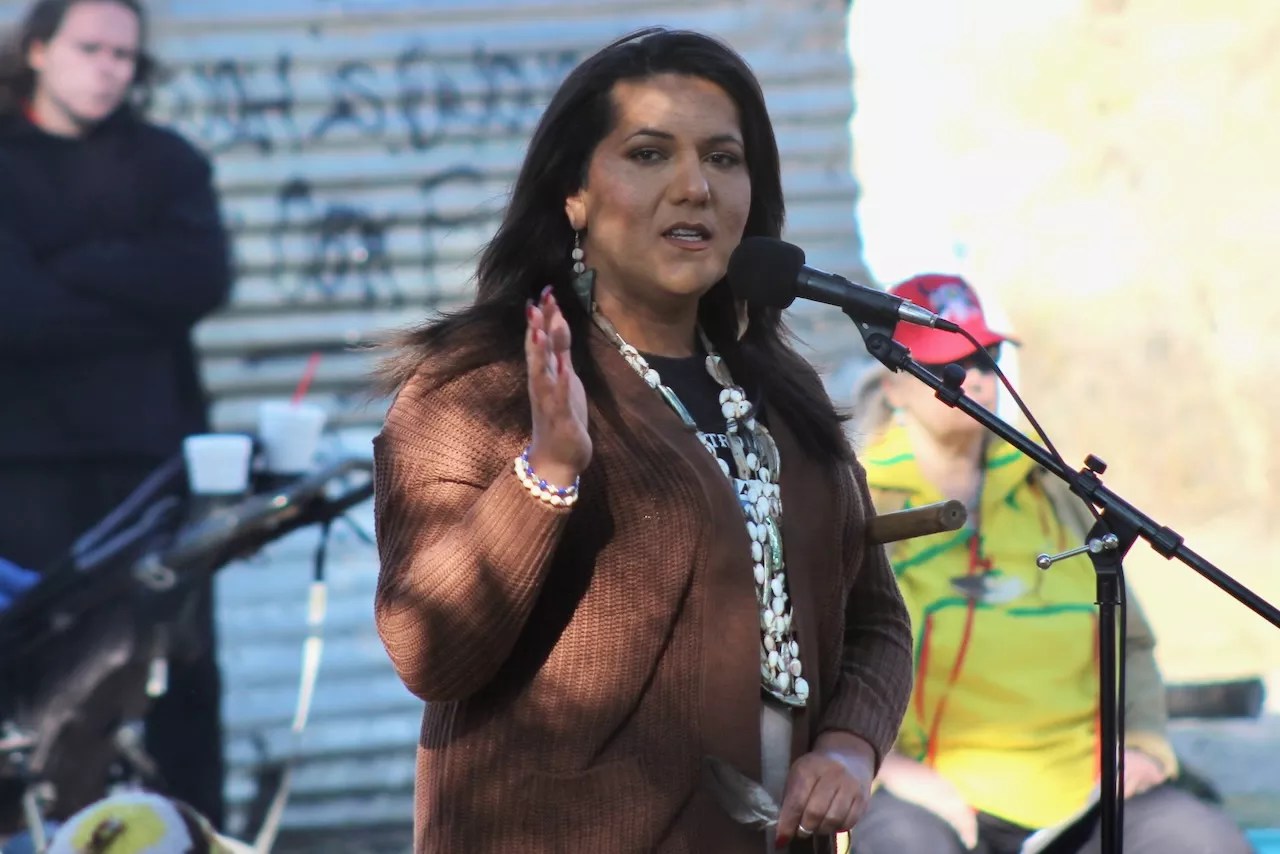
Carla Marie Munoz speaks to gatherers at Oak Flat on Nov. 4. Munoz is a councilmember of the Costanoan Rumsen Carmel Tribe, one of the Ohlone groups that lived in present-day coastal California for thousands of years.
TJ L’Heureux
How Oak Flat resistance started
As part of Tonto National Forest, Oak Flat is owned by the federal government. In 2014, during last-minute negotiations for a military funding bill, Sen. John McCain snuck a land swap agreement into the legislation authorizing the U.S. to trade Oak Flat to Resolution Copper. President Barack Obama signed the bill into law.
McCain, who in the 2014 and 2016 election cycles received about $12,000 from Rio Tinto’s political action committee, was condemned by various groups for the surreptitious move. A New York Times columnist called the deal “an impressive new low in congressional corruption.”
The legislation set off protests to repeal the land swap. McCain was chased off the Navajo Nation in 2015 while at an event to commemorate the Navajo code talkers.
“When John McCain did that, it all came to reality for me that we cannot depend on the politicians because they are in the pockets of the lobbyists and the corporations,” Nosie said.
Nosie also said he was disappointed by the congressional Democrats of Arizona. He said many of them told him they couldn’t win reelection if they fought against the copper mine. Rep. Raúl Grijalva of Tucson has been an exception, having repeatedly introduced the “Save Oak Flat from Foreign Mining Act.”
In court, Apache Stronghold is represented in part by the Becket Fund for Religious Liberty, a nonprofit law firm based in Washington, D.C. The lawsuit alleged that the proposed mine would “irreparably harm the religious expression and practices of the region’s first inhabitants.” It also contended that the deal violates religious freedom and that the land should be protected due to an 1852 treaty the U.S. government made with Western Apache tribes.
But the case isn’t holding up the land swap. For it to take place, an environmental review must be completed by the U.S. Forest Service. After that, the land must be transferred within 60 days of the final environmental review, according to the land swap legislation from McCain. A review draft published in 2019 received pushback from Apache tribes for not considering religion. After the final review was published in January 2021, the Biden administration rescinded it in March, just before the 60-day deadline.
According to Angela Wu Howard – a senior law fellow at the Becket Institute, an academic project of Becket – whoever is on the losing side of the pending circuit court decision is “almost certainly going to appeal” to the Supreme Court, which could hear the case or decline to take action.
Oak Flat is attractive to politicians because copper is an efficient conduit, making it a critical material for the transition to renewable energy. A new mine also would boost the area’s economy and likely bring jobs to nearby Superior.
But after the mineral deposits are extracted, the area would be left with a crater deep enough to fit the Eiffel Tower. Critics also have noted that the mine will use 250 billion gallons of water over 40 years, a huge amount for an area already suffering from drought. And any water left in the ground and in the Gila River could be contaminated by toxic mine trailings.
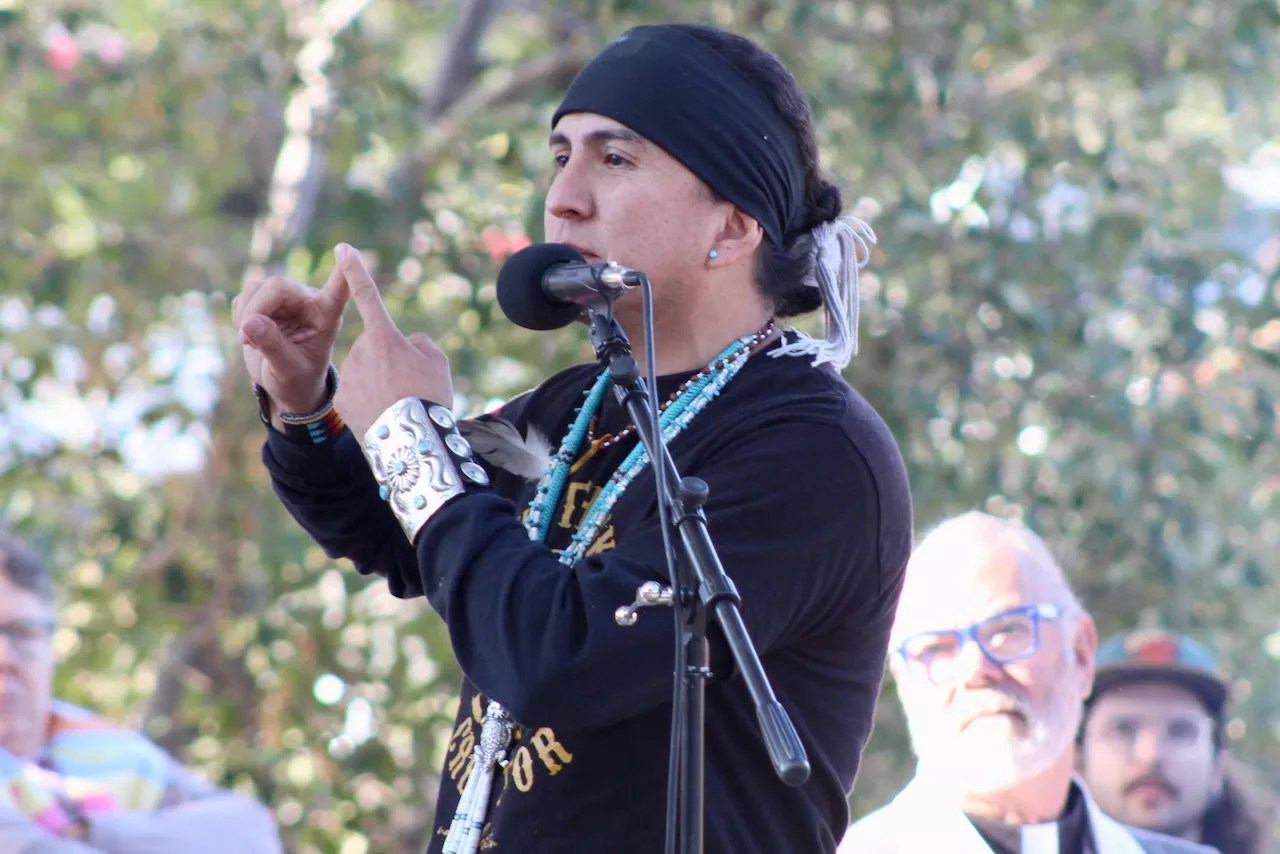
Darrell Marks, an Indigenous Dine’/Navajo and the Native American Academic Advisor for Flagstaff High School, lamented the campaign funds needed to run for office, corporate money in politics and the possibility of exhausting key resources like water during a Nov. 4 event.
TJ L’Heureux
‘We’re talking about the spirit of the Earth’
Though the Oak Flat case in federal court is about religious freedom, Nosie and other faith leaders at the Nov. 4 prayer gathering denounced the forces that have made humans treat the Earth like a disposable object.
“What we’re trying to do is wake up the American people,” Nosie told New Times.
Nosie sees the struggle over Oak Flat as a larger existential question: Can corporations that destroy the Earth to gain a short-term profit be stopped before it’s too late?
“We’re at that turning point right now, this very moment. If we don’t do the right thing beginning now, there’s no turning back from the damages of the decisions we’ve made and the capitalist way of thinking,” Nosie said. “We’re talking about the spirit of the Earth and its survival. We know as Native people we’re at that point in time of no return if we don’t wake up.”
Nosie and other speakers at the event noted that industrial mining and other profit-seeking ventures have done great damage to the environment, contaminated water, desecrated ecosystems and spread plastics even to remote parts of the world.
“The general public are not aware that they are part of this. We consume what they continue to give out,” Nosie said. “They feed off the weakness of us people to want more and more. That’s going to continue until we learn how to know what is enough.”
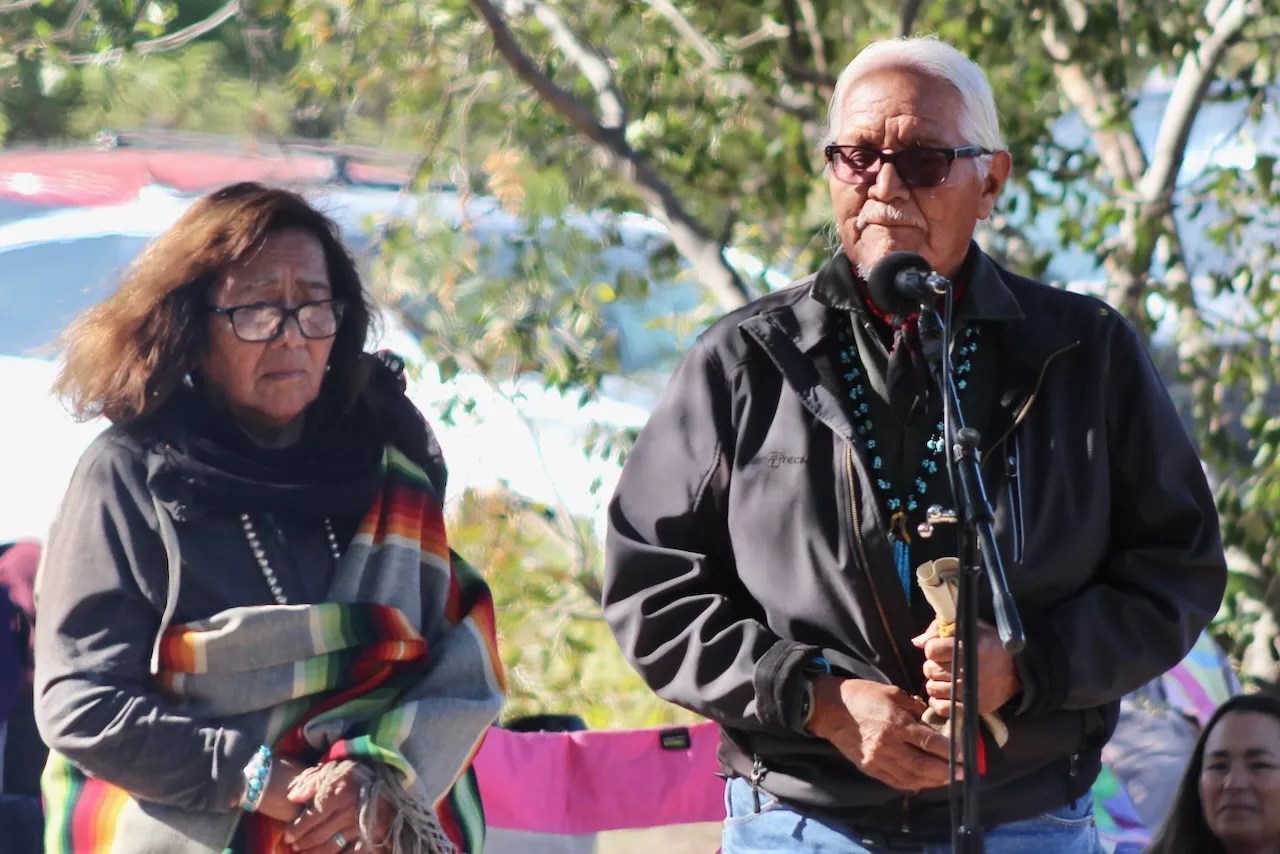
Larry and Mattie Foster are Diné, members of the Navajo Nation. They joined Apache Stronghold leaders and supporters in solidarity and spoke out against Resolution Copper’s proposed mine at Oak Flat.
TJ L’Heureux